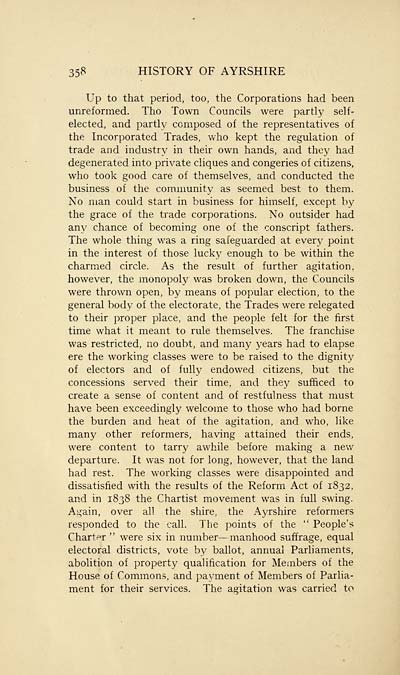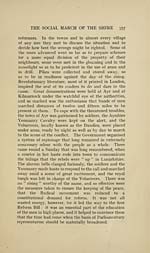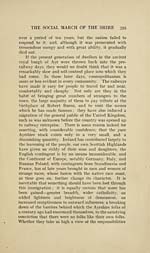Download files
Complete book:
Individual page:
Thumbnail gallery: Grid view | List view

358 HISTORY OF AYRSHIRE
Up to that period, too, the Corporations had been
unreformed. Tho Town Councils were partly self-
elected, and partly composed of the representatives of
the Incorporated Trades, who kept the regulation of
trade and industry in their own hands, and they had
degenerated into private cliques and congeries of citizens,
who took good care of themselves, and conducted the
business of the community as seemed best to them.
No man could start in business for himself, except by
the grace of the trade corporations. No outsider had
any chance of becoming one of the conscript fathers.
The whole thing was a ring safeguarded at every point
in the interest of those lucky enough to be within the
charmed circle. As the result of further agitation,
however, the monopoly was broken down, the Councils
were thrown open, by means of popular election, to the
general body of the electorate, the Trades were relegated
to their proper place, and the people felt for the first
time what it meant to rule themselves. The franchise
was restricted, no doubt, and manj' years had to elapse
ere the working classes were to be raised to the dignity
of electors and of fully endowed citizens, but the
concessions served their time, and they sufficed to
create a sense of content and of restfulness that must
have been exceedingly welcome to those who had borne
the burden and heat of the agitation, and who, like
many other reformers, having attained their ends,
were content to tarry awhile before making a new
departure. It was not for long, however, that the land
had rest. The working classes were disappointed and
dissatisfied with the results of the Reform Act of 1832,
and in 1838 the Chartist movement was in full swing.
Again, over all the shire, the Ayrshire reformers
responded to the call. The points of the " People's
Charter " were six in number — manhood suffrage, equal
electoral districts, vote by ballot, annual Parliaments,
abolition of property qualification for Members of the
House of Commons, and payment of Members of Parlia-
ment for their services. The agitation was carried to
Up to that period, too, the Corporations had been
unreformed. Tho Town Councils were partly self-
elected, and partly composed of the representatives of
the Incorporated Trades, who kept the regulation of
trade and industry in their own hands, and they had
degenerated into private cliques and congeries of citizens,
who took good care of themselves, and conducted the
business of the community as seemed best to them.
No man could start in business for himself, except by
the grace of the trade corporations. No outsider had
any chance of becoming one of the conscript fathers.
The whole thing was a ring safeguarded at every point
in the interest of those lucky enough to be within the
charmed circle. As the result of further agitation,
however, the monopoly was broken down, the Councils
were thrown open, by means of popular election, to the
general body of the electorate, the Trades were relegated
to their proper place, and the people felt for the first
time what it meant to rule themselves. The franchise
was restricted, no doubt, and manj' years had to elapse
ere the working classes were to be raised to the dignity
of electors and of fully endowed citizens, but the
concessions served their time, and they sufficed to
create a sense of content and of restfulness that must
have been exceedingly welcome to those who had borne
the burden and heat of the agitation, and who, like
many other reformers, having attained their ends,
were content to tarry awhile before making a new
departure. It was not for long, however, that the land
had rest. The working classes were disappointed and
dissatisfied with the results of the Reform Act of 1832,
and in 1838 the Chartist movement was in full swing.
Again, over all the shire, the Ayrshire reformers
responded to the call. The points of the " People's
Charter " were six in number — manhood suffrage, equal
electoral districts, vote by ballot, annual Parliaments,
abolition of property qualification for Members of the
House of Commons, and payment of Members of Parlia-
ment for their services. The agitation was carried to
Set display mode to:
![]() Universal Viewer |
Universal Viewer | ![]() Mirador |
Large image | Transcription
Mirador |
Large image | Transcription
Images and transcriptions on this page, including medium image downloads, may be used under the Creative Commons Attribution 4.0 International Licence unless otherwise stated. ![]()
| Histories of Scottish families > Ayrshire > Volume 1 > (368) Page 358 |
|---|
| Permanent URL | https://digital.nls.uk/95198702 |
|---|
| Attribution and copyright: |
|
|---|
| Description | A selection of almost 400 printed items relating to the history of Scottish families, mostly dating from the 19th and early 20th centuries. Includes memoirs, genealogies and clan histories, with a few produced by emigrant families. The earliest family history goes back to AD 916. |
|---|

